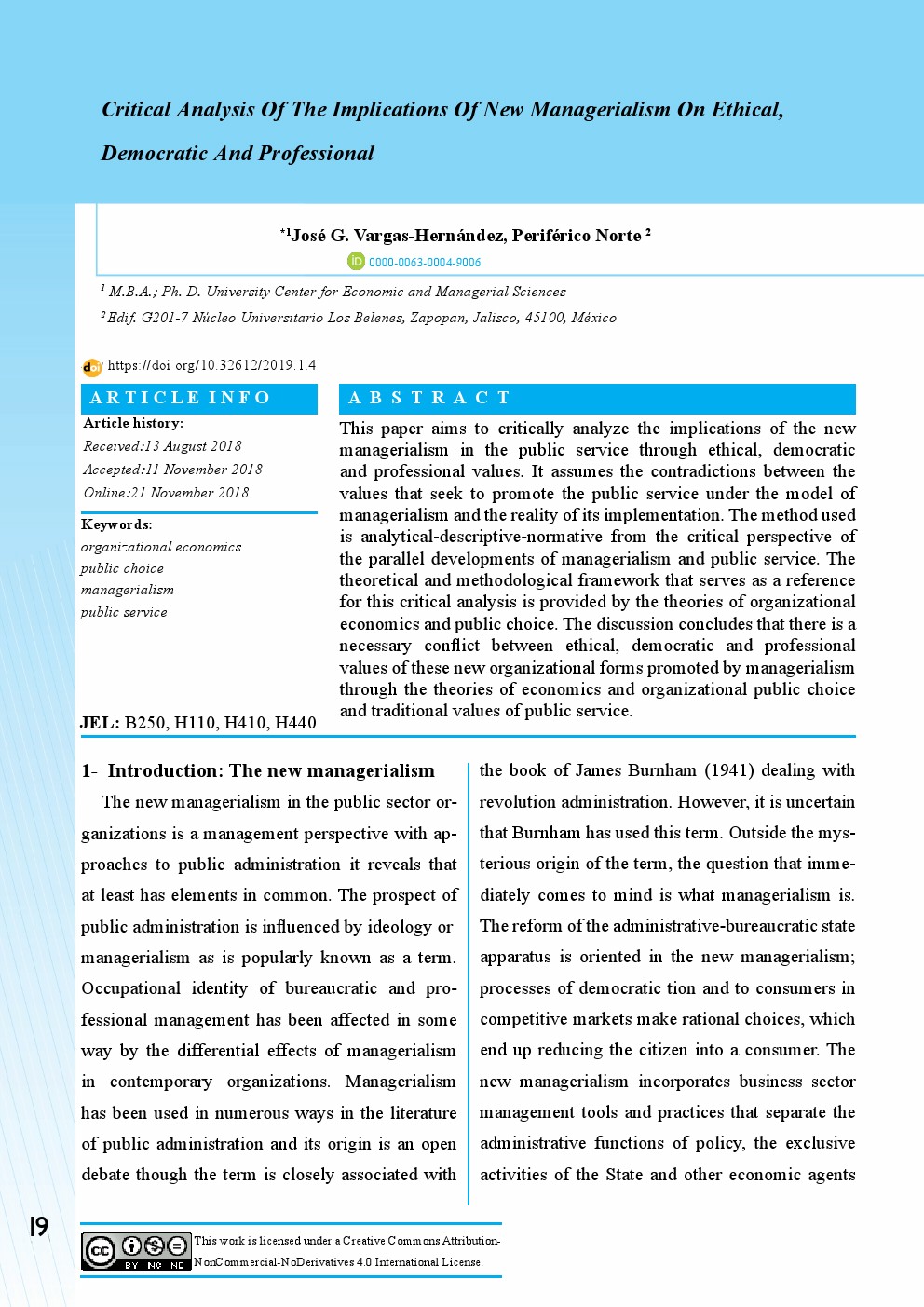Critical Analysis Of The Implications Of New Managerialism On Ethical, Democratic And Professional
Main Article Content
Abstract
This paper aims to critically analyze the implications of the new managerialism in the public service through ethical, democratic and professional values. It assumes the contradictions between the values that seek to promote the public service under the model of managerialism and the reality of its implementation. The method used is analytical-descriptive-normative from the critical perspective of the parallel developments of managerialism and public service. The theoretical and methodological framework that serves as a reference for this critical analysis is provided by the theories of organizational economics and public choice. The discussion concludes that there is a
necessary conflict between ethical, democratic and professional values of these new organizational forms promoted by managerialism through the theories of economics and organizational public choice and traditional values of public service.
Downloads
Article Details

This work is licensed under a Creative Commons Attribution-NonCommercial-NoDerivatives 4.0 International License.
References
2- Barnard, Ch. (1938). The functions of the executive. Cambridge: Harvard University Press (Fifteenth printing, 1962).
3- Burnham, J. (1941). The Managerial Revolution. (Bloomington,Ind.: University of Indiana Press, Midland Books, 1960 reprintedition; originally published 1941).
4- Burrel, G. And Morgan, G. (1979). Sociological paradigms and organizational analysis. Portsmouth, NH: Heinemann Educational Books.
5- Clarke, J. and Newman, J. (1997). The managerial state. Sage. London.
6- Coleman, J. (1988). Social capital in the creation of human capital. American Journal of Sociology, Supplement, Vol. 95, pp. 95-120.
7- Denhardt R. (1981). Is the shadow of organization. Lawrence, KS. The Regents Press.
8-Harmon, M. and Mayer, R. (1986). Organizational Theory for Public Administration. Boston: Little, Brown.
9- Hage, J., and Finsterbusch, K. (1987). Organizational change as a development strategy: Models & tactics for improving third world organizations. Boulder, CO.:L. Reinner Publishers.
10- Klein, P. G. (1998). New Institutional Economics, en Edward Elgar and the University of Ghent, Encyclopedia of Law and economics. Edward Elgar and the University of Ghent.
11- March, J.G. y Olsen, J.P.(1995). Democratic Governance, New York, The Free Press.
12- Martínez Nogueira, R. (2001). Estado, sociedad civil y gestión pública. Parte I y II, Magazine No. 25, Instituto Internacional de Gobernabilidad, 18 de diciembre del 2001.
13- Merton, R.K. (1957). The Role Set: Problem in Sociological Theory. British Journal of Sociology, VIII, June: 113 ff.
14- Moe, R. C. and Gilmour, R. S. (1995). Rediscovering principles of public administration: The neglected principles of public law. Public Administration Review , 55, (2), 135-146.
15- Nahallel, A. (2000). European Monetary Union’s Deficiencies in Credible Commitment against monetary expansion, Cornell International Law Journal, Vol. 33 (2000), 1. P. 273.
16- ODA, Overseas Development Administration (1993). Good government technical note No. 16, London: ODA.
17- O’Donnell, G. (1999). Horizontal accountability and new polyarchies, en Schedler, Andreas, et al., The Self-Restraining State: Power and accountability in New Democracies, Lynne Rienner, Boulder and London, págs. 29-52.
18- Orozco, M. (2001). Democracia y participación ciudadana, Instituto Internacional de Gobernabilidad. Magazine no. 23, 6 de noviembre del 2001.
19- Pollit, Ch. (1990). Managerialism and the public service. The Anglo-American experience, Cambridge MA, Basil Blackwell.
20- Portes, A. (1998). Social Capital: Its Origins and Applications in Modern Sociology. Annual Review of Sociology, 24: 1-24.
21- Portes, A. and Sensenbrenner, J. (1993). Embeddedness and Immigration: Notes on the Social Determinants of Economic Action. The American Journal of Sociology, Vol. 98, No. 6 (May, 1993), pp. 1320-1350. Published by: The University of Chicago Press.
22- Reichard, S. (1996). Ideology drives health care reforms in Chile. Journal of Public Health Policy 17(1): 83-98.
23- Sartori, G. (1999). En defensa de la representación política, Claves de razón práctica. P. 91.
24- UNESCO (1997). Nuestra diversidad creativa, Informe de la Comisión Mundial de Cultura y Desarrollo, México, 1997.
25- Weber, M. (1982). La política como vocación, en Escritos políticos, Volumen II, FoliosEdiciones, México, pp- 308-364.
26- Weber, M. (1978). Economy and society (G. Roth & C. Wittich, Eds.). Berkeley: University of California Press.
27- Weber, M. (1946). Bureaucracy, Oxford Press. White, O. F., Jr and Mcswain, C. (1990). The Phoenix project. Raising a new image of public administration from the ashes of the past. Administration and Society Vol. 12(19, 3-38.
28- Williamson, O. E. (2000). Why law, economics, and organization?, Business and Public Policy Working Paper BPP-81. Institute of Management, Innovation and Organization, University of California, Berkeley.
29- World Bank (1992). Governance and development. Washignton, D. C: World Bank

